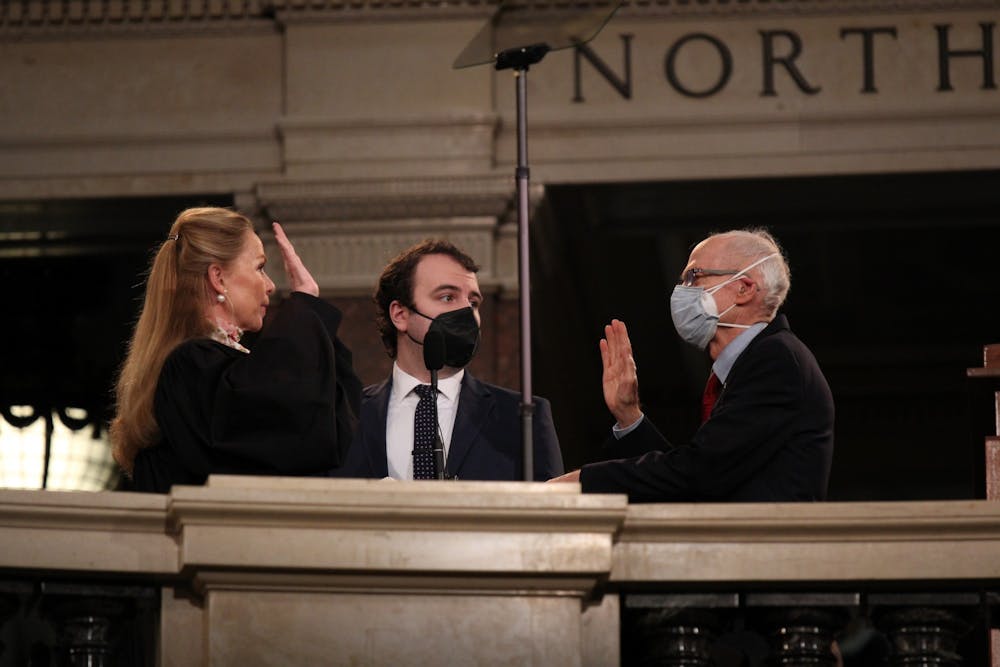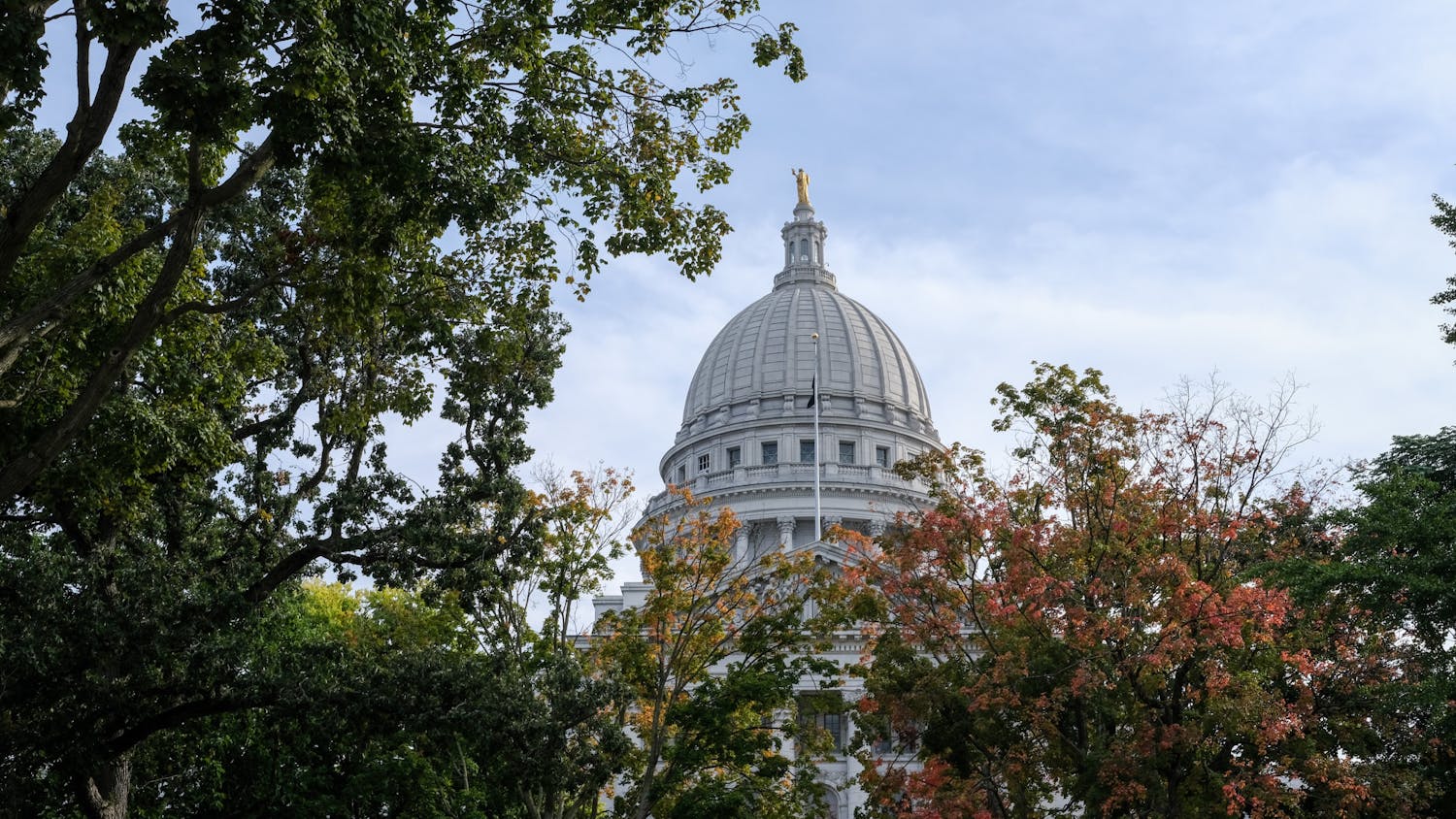Tony Evers outlined a platform of affordability, access and equity during his inaugural address Tuesday at the State Capitol, where he was sworn in for a second term as Wisconsin’s 46th governor.
Lt. Gov. Sara Rodriguez, Attorney General Josh Kaul, Secretary of State Doug La Follette, State Treasurer John Leiber and members of the state Senate and Assembly were also sworn in Tuesday at a ceremony filled with civic pomp and pride — themes Evers echoed in his address.
“To take the oath as governor — an oath only 45 people have taken before me — is an extraordinary privilege,” Evers said. “Each time this oath is taken is a profound display of democracy.”
Evers defeated Republican gubernatorial nominee Tim Michels by a 3.4% margin in last November’s midterm elections. Evers made defending democracy a central theme of his campaign, characterizing himself as a “goalie” blocking bills from the Republican-controlled Legislature.
The governor positioned his reelection as a rebuke of “the bitter politics of resentment.”
“Wisconsin rejected a trajectory bent toward permanently undermining the tenets and institutions that are fundamental to who we are as a people,” Evers said Tuesday. “Given the opportunity to further enable cynicism and hate, Wisconsinites chose kindness and they chose hope instead."

Evers’ granddaughter, Tessa Schoenecker, called the youth vote a “decisive factor” in the midterm elections in a speech introducing her grandfather.
“The issues on the table this year were huge, and I know many of us were motivated to not only vote ourselves but convince those around us to vote,” Schoenecker said.
Evers outlined policy priorities for the next four years in his speech, which included affordable housing, Medicaid expansion, clean water, broadband internet expansion and more resources for public education.
He also renewed calls to repeal Wisconsin’s 1849 law that outlaws virtually all abortions in the state. The ban was reinstated last June after a U.S. Supreme Court ruling in Dobbs v. Jackson eliminated the constitutional right to abortion.
“We shouldn’t be beholden to a law from the 1800s passed well before women had the right to vote,” Evers said Tuesday.
The governor framed abortion access as a potential solution to Wisconsin’s shrinking workforce and “brain drain” of highly educated students.
“If we want to make sure we can compete for talented workers and businesses against other states, then we ought to start by making sure that when workers and businesses look at relocating to Wisconsin, part of that calculus doesn’t include themselves, their loved ones or their workers being stripped of their reproductive freedom just for moving here,” he said.

Budget season approaches
Evers begins his second term facing an enlarged Republican majority in both houses of the Legislature. Tensions between Evers and the Legislature flared throughout his first term, leading to intense partisan gridlock on policing, elections law and COVID relief funds, among other topics.
Relations warmed following the November election as parties opened up lines of communication. Assembly Speaker Robin Vos (R-Rochester) said in November he and Senate Majority Leader Devin LeMahieu (R-Oostburg) have spoken with Evers more since the election than they have in the past two years, according to the Milwaukee Journal Sentinel.
Evers repeated calls for bipartisanship in his speech Tuesday.
“I also know that not everyone who voted this past November agrees with me all the time, or belongs to the same party I do, or shares my same core values and beliefs,” Evers said.
State leaders will enter Wisconsin’s biennial budget process with a record-high $6.6 billion surplus, which could increase to $6.9 billion if a projected increase in the state’s Medicaid fund holds, according to WisPolitics.
And though parties want to spend more on roads, K-12 education, tax reform and local government, their approaches differ.
Evers called for “transformational improvements” in state investments for local communities and expanded public school resources on Tuesday. He also alluded to his previously proposed 10% middle-class tax cut.
“When we deliver tax relief, it should be targeted to the middle class to give working families a little breathing room in their family budget, not to give big breaks to millionaires and billionaires who don’t need the extra help to afford rising costs,” Evers said Tuesday.
However, Republicans refuse to use surplus money to expand the size of government, according to the Wisconsin Examiner. Party leaders have expressed interest in expanding school choice programs and private school vouchers.
Senate Republicans also want to introduce a flat income tax rate of 3.5% across all tax brackets, a proposal Evers labeled a “non-starter,” according to the Cap Times.
A 3.5% flat tax rate would reduce state revenues by approximately $4 billion annually without introducing other ways to raise revenue, according to the Journal Sentinel.
The governor will present his budget proposal in February. The budget process then moves to the Legislature, where the Joint Finance Committee will conduct statewide public hearings before drafting its own proposal this spring.
But on Tuesday night, Evers took a moment to celebrate his second term with an inaugural gala hosted at Monona Terrace, where he delivered a speech to supporters and polka danced with his wife as the University of Wisconsin Marching Band played.
“Well, Wisconsin, we won,” Evers said. “Who says boring doesn’t work?”

Tyler Katzenberger is the former managing editor at The Daily Cardinal. He also served as the state news editor, covering numerous protests, elections, healthcare, business and in-depth stories. He previously interned with The Capital Times, Milwaukee Journal Sentinel and is an incoming POLITICO California intern. Follow him on Twitter at @TylerKatzen.






